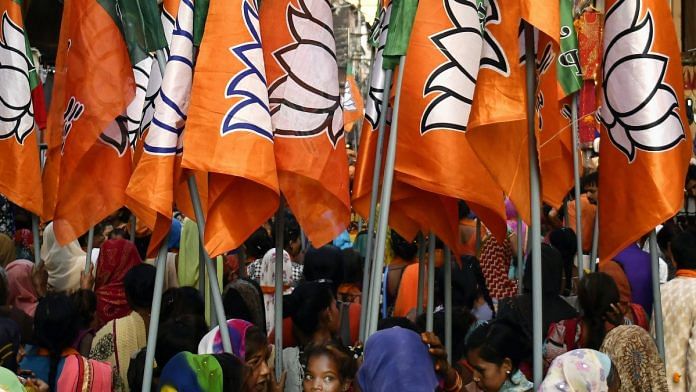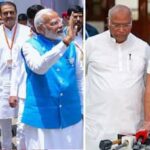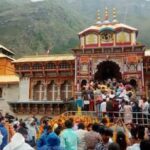Hindu Bengalis are not so much divided by caste as they are along class lines. But for both the Bhadralok and the non-Bhadralok, the river fish remains the raison d’être, even as the debate over secularism muddies the waters between them. Show me a Bengali who doesn’t like fish and I will show you an impostor. Fish is indeed religion for Bengal because an incident far away from home, in south Delhi’s posh, largely Bengali neighbourhood of CR Park, got them both squirming.
A that went viral showed a group of men objecting to the sale of fish next to a temple, saying that it hurts their sentiments. “This is wrong. Sanatan says we cannot harm anyone,” a man was heard saying. He also said serving meat to the Goddess is “fictional” and there is no proof of this in Hindu religious scriptures.
TMC MP Mahua Moitra promptly shared the video and accused “BJP goons” of threatening fish-eating Bengalis. “Please watch saffron brigade BJP goons threaten fish-eating Bengalis of Chittaranjan Park, Delhi. Never in 60 years has this happened, residents say,” she .
BJP IT cell head quickly clarified the video is “false and fabricated” and “appears to have been shot with the intent to promote ill will among communities.” But Moitra had managed to hit the BJP where it hurts the most when it comes to West Bengal: the idea that the party does not get Bengali sensibility.
The CR Park fish market controversy reminded Bengalis of the they face every year by non-Bengalis who think consuming non-vegetarian meals during Durga Puja is an aberration. The puja days are celebrated as Navratri in North India, where most non-vegetarians give up eating meat for nine days.
This clash of divergent gastronomical cultures may seem trivial, but it’s not. It helps Mamata Banerjee and her party in branding the BJP as a party of outsiders that do not even get Bengali Hinduism, forget other aspects of their cultural identity. To learn a thing or two about the Bengalis, there’s a video of a man speaking to a reporter after the row in CR Park. He said if there’s a problem, the temple should be shifted. Why target the fish?
In the 2021 assembly elections, the BJP had mounted a spirited campaign against the Mamata Banerjee government. It accused the government of large-scale corruption, Covid-19 mismanagement, syphoning of Amphan relief funds, and political violence against its party cadre, among others. Banerjee won by a landslide. Among the BJP’s many strategic blunders was its inability to grasp Bengali sub-nationalism.
A no less serious concern is the BJP’s inability to stand by its party cadre, supporters, and the Hindu population in West Bengal’s hinterlands during times of trouble. Take the recent violence in Murshidabad. , reporting for Rashtriya Swayamsevak Sangh (RSS) mouthpiece Organiser on the fallout over the Waqf law, wrote on X: “Earlier under pretext of #CAA, and now using #Waqf as tool, Islamists have consistently targeted Hindus—their places of worship & their properties. The underlying agenda appears to be a systematic effort to weaken Hindus socially, economically, spiritually, and in terms of physical safety.”
On the other hand, not just Mamata Banerjee, but other political voices have blamed the BJP for the violence in Murshidabad. Announcing his open support for Banerjee, Samajwadi Party President Akhilesh Yadav has said:
“The saffron brigade always seeks to take advantage of riots by playing the Hindu-Muslim card.”
Whether you believe in the BJP-RSS version of events or demand a more nuanced perspective on the communal political violence in Bengal, one fact remains undisputed: BJP’s inability to stand by the non-Bhadralok Hindu in their time of need. Bengal BJP chief Sukanta Majumdar has made provocative statements in the past. “I will not attack anybody overtly, but if I have to resort to violence to save my religion, I believe it is justified and is a pious task,” he had .
As hundreds of Hindu families from Murshidabad fled across the Bhagirathi River to neighbouring , the non-Bhadralok Bengali Hindus had no one to turn to.
“The BJP is into lazy politics against an astute politician like Mamata Banerjee who knows how to win narrative wars,” Deba Pratim Ghatak, author of The Original Lynch Mob: The Untold Stories of Political Violence in West Bengal, told ThePrint.
“The party should be seen as doing for the Bengali Hindu in her time of distress and not just offer platitudes after the violence is over.”
BJP supporters, led by Sukanta Majumdar, with the police in Dakshin Dinajpur during a protest over the Murshidabad violence. A cadre from the Bharatiya Janata Yuva Morcha, the party’s youth wing, told ThePrint on condition of anonymity that both the BJP workers and supporters in Bengal feel let down.
“Imagine if Mamata Banerjee were in Opposition and the Murshidabad violence had happened. She would have made sure the matter reaches the UN, and here our leaders are venting their anger on X,” said a party worker.
Not ordering a National Investigation Agency (NIA) investigation into the incident, deploying BSF only after a court order, and not imposing section 355 are blunders of the state government that BJP’s senior leaders are failing to understand, he added.
And it is not just Murshidabad that has left the non-Bhadralok Bengali Hindu disappointed. Having covered the 2021 assembly elections and the violence before, during, and after the polls, I heard many voices of protest—from within the party cadre and its supporters—about the party’s perceived inaction.
As West Bengal gears up for the next assembly polls in 2026, it is high time the BJP made a serious effort to understand the state it hopes to win. Because unlike in 4D chess, in real politics, today’s blunders rarely turn into tomorrow’s victories.
(Edited by Ratan Priya)








